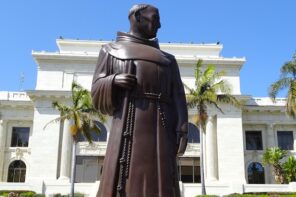In advance of the Catholic Church’s recent global gathering, Pope Francis raised the hopes of LGBTQ Catholics that progress may be on the horizon through a series of letters and reports that hinted at possible advancements through the Synod on Synodality. In the end, not only was there no concrete progress, but, as Mary Hunt observes:
[N]ot even the initials LGBTIQ+ merited a mention in the report despite their prominence in the preparatory materials and many synod reports from around the world. Backsliding in the face of opposition is not surprising, but complete ghosting (other than two cryptic mentions of sexuality) suggests the pathological fear that grips some church officials at the mere mention of the truth of many lives, including some of their own.
Life for queer Catholics continues to be marked by an ongoing struggle over how to live and practice Catholicism while queer. Participants at the Synod were even offered a story of a young bisexual woman who committed suicide due to not feeling welcome in the Church. While the story drew tears, sympathy, and calls for universal welcome, no concrete changes came as a result. And this young woman’s story is not unique.
Reporter Simon Kent Fung’s podcast Dear Alana documents the life and death of Alana Chen, who committed suicide in 2019 at the age of 24 after a lifelong struggle, including conversion therapy facilitated by her local church. The show reached the top spot on Apple Podcasts before concluding on September 25. In the process of telling Chen’s story, Fung, also a gay Catholic, shares his own, which likewise includes years spent in conversion therapy trying to “fix” himself and reconcile his religion with his sexuality.
Fung expertly documents the suffocating reality of navigating between the personal and the institutional when it comes to how church doctrine and self-doubt manifested in Chen’s life; she believed in a loving, all-powerful, benevolent God, yet was told the same loving God frowned upon her sexuality. Working from interviews with Chen’s friends and family, as well as her extensive collection of personal journals, Fung traces Chen’s journey into Catholicism and her struggles with what she calls her “SSA,” or “same sex attraction,” a term the church prefers over LGBTQ (an apparently unspeakable term, according to the Synod) or “homosexuality.”
As a young teen, on the advice of priests and spiritual advisors, Chen comes to resent her attraction to women and to approach it as a personal failing to be weeded out. So she longs to become a nun and dedicate her life to the church, a path historically followed by many LGBTQ Catholics; in some Catholic religious communities estimates of the LGBTQ population range from 15 to 60 percent (or even, as one recent book alleges, 80 percent). Like so many others before her, however, Chen can’t escape the deep depression that accompanies her inability to deny her attraction to women—her journal entries whip back and forth between descriptions of girls she has crushes on and her subsequent self-loathing.
Over the course of eight episodes, Fung follows Chen’s journey to devout Catholicism, beginning with her time at a summer camp run by a local Catholic Church when she was 13 years old, quickly followed by her rapid devotion to Catholic teachings. While other kids snuck out to go to parties or see their friends, Chen snuck out to attend mass.
As Fung follows Chen’s growing entanglement with the Catholic Church, he also shows how the church’s top-down institutional stance against homosexuality informed the way Chen’s own parish and spiritual advisors treated her when she confessed to feelings of attraction towards women. And when Chen eventually sought mental health treatment, began to accept herself, and started to drift away from the church’s teachings, she was shunned, which drove her into a debilitating depression.
Fung handles the story with a great deal of care and respect; care for Chen and her family, care for himself as a victim and survivor of conversion therapy, and, despite what some may expect, respect for Catholicism as a religion that powers and permeates so many people’s lives. Chen didn’t come from a Catholic or even particularly religious family; her religious pursuit was hers alone, and Fung is careful to never disparage or critique the very real and passionate personal faith Chen held so deeply.
Listeners may be surprised to learn that Fung doesn’t come to the conclusion that Catholicism and queer identity are irreconcilable or at odds with one another; in fact, he is further reaffirmed and secured in his own position as a gay Catholic who finds strength in his religion. It’s clear from Fung’s measured and poignant narration that producing this podcast in itself was a spiritually healing experience.
While he expresses anger and frustration with the Church—its leaders, its rhetoric that told him his sexuality was a sin—his anger isn’t directed at God. In a poignant remark in the final episode, he realizes, “I can look at myself and begin to believe that maybe, I’m not the damaged person I thought I was. And that God hasn’t answered my prayers, because he can’t heal what isn’t broken.”
In an interview with Mother Jones, Fung shared that “[what] this project is trying to do is to not show a conclusion, but a journey.” Listeners are indeed treated to a journey: one that asks who is culpable when the weight of an institution as massive and all-encompassing as the Roman Catholic Church weighs on the shoulders of one young woman. Can the church be held accountable for the tragic end to Alana Chen’s life? What would accountability even look like? Fung doesn’t offer easy answers, preferring instead to let the questions linger in listeners’ minds:
Who is responsible when something goes wrong? It’s almost as if, by design, no one is. The Church can stay in its own protected spiritual lane and claim that it leaves the mental health to the therapists. But what if the line between religious practice and mental health is a lot more blurry than that? Theology can have real consequences on how we see ourselves. Are we ready for that conversation?
Ultimately, Dear Alana highlights the human angle at the heart of questions that were supposedly up for debate at the Synod on Synodality, which will continue next year in Rome. As church officials and laypeople gather at meetings like these to discuss what the future of the church holds for queer Catholics, they’re debating the beliefs that have profound effects on Catholics across the globe, including in Boulder, Colorado, where Alana Chen lived and struggled with them every day.
Whether or not the church should be considered culpable in her death, it would be hard to argue that it isn’t, at the very least, partly responsible. What’s undeniable is that the beliefs it debates (or ignores) at its gatherings will continue to ripple out to LGBTQ Catholics across the world. If it refuses to change and grow, it may well find itself on the outside looking in at a thriving community of Catholics with little use for a rigid institution.





